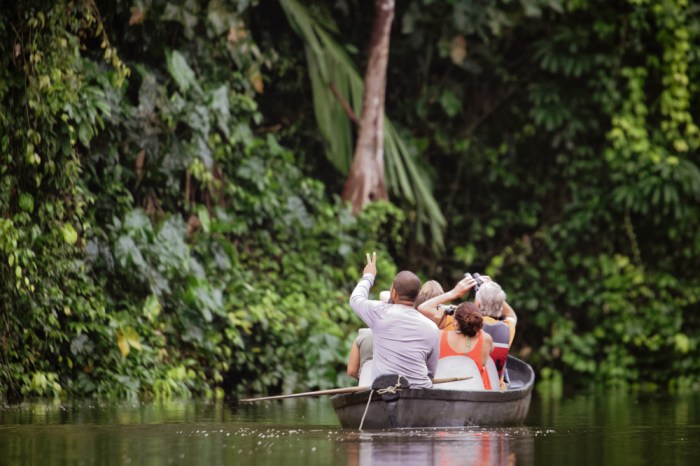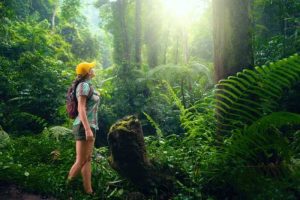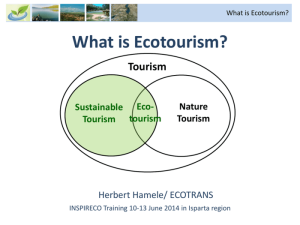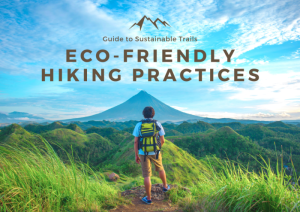
Embark on a journey through Eco Tours in National Parks, where nature and conservation intertwine to offer a unique experience for visitors. From lush forests to vibrant ecosystems, these tours are designed to educate and inspire while promoting sustainability.
Discover the beauty of our natural world while making a positive impact by participating in eco-friendly adventures within these protected areas.
Introduction to Eco Tours in National Parks

Eco tours in national parks offer a unique opportunity for visitors to explore the natural beauty and wildlife while also learning about conservation efforts and sustainable practices.
Examples of Popular National Parks with Eco Tours
- Yellowstone National Park in the United States offers eco tours that focus on wildlife conservation and geothermal features.
- Galapagos National Park in Ecuador provides eco tours that emphasize the protection of endemic species and fragile ecosystems.
- Kruger National Park in South Africa offers eco tours that highlight the importance of anti-poaching efforts and community involvement in conservation.
Importance of Eco Tours in Promoting Conservation and Sustainability
Eco tours play a crucial role in raising awareness about the importance of preserving natural habitats and wildlife in national parks. By educating visitors about conservation efforts and sustainable practices, eco tours help promote a culture of environmental stewardship and responsible tourism.
Benefits of Eco Tours in National Parks
Eco tours in national parks offer a range of benefits that contribute to the preservation and sustainability of these natural environments.
Environmental Benefits
1. Conservation of Biodiversity: Eco tours promote awareness about the importance of preserving the diverse flora and fauna found in national parks, contributing to the protection of endangered species.
2. Sustainable Practices: By following eco-friendly guidelines, such as minimizing waste and respecting wildlife habitats, these tours help reduce the negative impact of tourism on the environment.
Educational Benefits
1. Environmental Awareness: Eco tours provide visitors with firsthand experiences and knowledge about ecosystems, conservation efforts, and the significance of biodiversity, fostering a greater appreciation for nature.
2. Interpretive Programs: National parks often offer educational programs during eco tours, led by knowledgeable guides who share insights on the park’s history, geology, and wildlife, enriching visitors’ learning experiences.
Economic Advantages
1. Job Creation: Promoting eco tourism in national parks creates employment opportunities for local communities, including tour guides, park rangers, and hospitality staff, contributing to the economic growth of the region.
2. Revenue Generation: Eco tours attract visitors who support local businesses, such as accommodations, restaurants, and souvenir shops, stimulating the economy and providing funding for park maintenance and conservation efforts.
Activities Offered in Eco Tours

When participating in eco tours within national parks, visitors can engage in a variety of activities that focus on experiencing nature in a sustainable and responsible way. These activities not only allow for a deeper connection with the environment but also contribute to the conservation efforts within the parks.
Hiking and Nature Walks
- Guided hikes through designated trails
- Opportunities to observe wildlife in their natural habitats
- Learn about the flora and fauna from knowledgeable guides
Kayaking and Canoeing
- Exploring waterways and lakes while minimizing impact on the ecosystem
- Chance to spot aquatic wildlife such as birds, fish, and amphibians
- Appreciating the serene beauty of the park from a different perspective
Wildlife Watching and Photography
- Guided tours to seek out elusive species and capture them in their natural habitat
- Respecting wildlife viewing guidelines to ensure minimal disturbance
- Documenting the biodiversity of the park through photography
Stargazing and Night Safaris
- Experience the wonders of the night sky away from light pollution
- Spot constellations, planets, and shooting stars with the help of guides
- Participate in night safaris to observe nocturnal animals in action
Sustainable Practices in Eco Tours
Eco tours in national parks are committed to minimizing their environmental impact by implementing various sustainable practices. These practices not only help in preserving the delicate ecosystems of the parks but also contribute to the overall sustainability of the tourism industry.
Role of Local Communities in Supporting Eco Tourism Initiatives
Local communities play a crucial role in supporting eco tourism initiatives in national parks. By actively participating in eco tours as guides, hosts, or providers of local products and services, they help in promoting sustainable tourism practices. Their involvement also ensures that the benefits of tourism are shared with the local population, fostering a sense of ownership and pride in the conservation efforts.
Examples of Innovative Eco-Friendly Initiatives in Eco Tours
- Use of renewable energy sources such as solar panels to power tour vehicles and facilities, reducing reliance on fossil fuels.
- Implementation of waste reduction and recycling programs to minimize the generation of waste within the parks.
- Promotion of responsible wildlife viewing practices to ensure the safety and well-being of the animals.
- Engagement in conservation projects such as habitat restoration and reforestation to offset the environmental impact of tourism activities.
Importance of Ecotourism
Ecotourism plays a crucial role in promoting environmental awareness, protecting biodiversity in national parks, and fostering community engagement and sustainable development.
Significance of Ecotourism in Promoting Environmental Awareness
Ecotourism involves responsible travel to natural areas that conserves the environment and sustains the well-being of the local people. By engaging in ecotourism, visitors gain a deeper understanding and appreciation of the natural world, leading to increased environmental awareness and conservation efforts.
Contribution of Ecotourism to the Protection of Biodiversity
Ecotourism contributes to the protection of biodiversity in national parks by providing economic incentives for conservation. Revenue generated from ecotourism activities can be used to fund wildlife protection programs, habitat restoration, and anti-poaching efforts, ultimately safeguarding the rich diversity of flora and fauna in these protected areas.
Role of Ecotourism in Fostering Community Engagement and Sustainable Development
Ecotourism plays a vital role in fostering community engagement by involving local residents in tourism activities, creating employment opportunities, and supporting small businesses. This direct involvement of communities in ecotourism initiatives promotes sustainable development by ensuring that economic benefits are shared equitably and that local livelihoods are enhanced without compromising the natural environment.
As we conclude our exploration of Eco Tours in National Parks, one thing is clear: these experiences not only allow us to connect with nature but also play a crucial role in preserving it for future generations. Embrace the wonders of eco tourism and let your journey begin!
Clarifying Questions
Are Eco Tours suitable for all ages?
Eco Tours in National Parks are designed to cater to a wide range of ages and fitness levels. However, some tours may have specific age restrictions, so it’s best to check with the tour provider beforehand.
What should I bring on an Eco Tour?
It’s recommended to pack essentials such as water, sunscreen, comfortable clothing, and sturdy walking shoes. Additionally, don’t forget your camera to capture the breathtaking moments!
Can I participate in conservation activities during Eco Tours?
Many Eco Tours offer opportunities for visitors to engage in conservation activities such as tree planting, wildlife monitoring, and habitat restoration. These hands-on experiences allow participants to directly contribute to the preservation of the environment.





